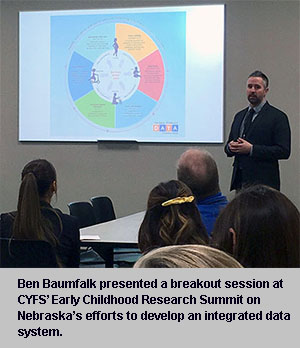 As research about the importance of the early years continues to grow, it’s becoming increasingly necessary that Nebraska stakeholders have access to early care and education data to help them make decisions about how best to prepare our young children for success.
As research about the importance of the early years continues to grow, it’s becoming increasingly necessary that Nebraska stakeholders have access to early care and education data to help them make decisions about how best to prepare our young children for success.
Nebraska is making progress toward developing an Early Childhood Integrated Data System (ECIDS) that will connect and maintain information from a variety of early childhood programs and services, allowing stakeholders to answer key questions about the effectiveness of our publicly funded efforts.
A fully functioning ECIDS connects data both horizontally (a child receiving multiple services at the same time) and vertically (integrating data from early childhood programs to K-12 data). Doing so allows states to provide distinct counts of various services children and families receive.
Below are examples of questions an ECIDS can answer:
- How many Nebraska children are participating in early childhood programs and services?
- What combinations of early childhood programs and services do children receive?
- Where are the gaps in access to and participation in high-quality early childhood programs and services in Nebraska?
- How effective are early childhood programs in preparing students for success in kindergarten and beyond?
Data Coalition Leads the Effort
The Nebraska group leading the effort to develop an ECIDS is the Early Childhood Data Coalition (ECDC), a volunteer group of public and private stakeholders. I was honored to become co-chair of the ECDC recently, carrying on the work of outgoing chair Sara Ann Kotchian. Co-chair Dr. Greg Welch (Associate Director of Research and Evaluation with the Buffett Early Childhood Institute) and I are speaking with various groups about the potential power of an ECIDS in Nebraska and covering policy issues states confront when trying to ensure public funds are being used appropriately and effectively.
I recently presented to the Nebraska Early Childhood Interagency Coordinating Council (ECICC) on our work to date and the need for continued support. ECICC members are appointed by the Governor and tasked with producing a biennial report with recommendations for state early childhood officials. I left the group with a quote from Elliot Regenstein, formerly with The Ounce of Prevention, regarding progress on early childhood policy issues: “If your state doesn’t have a unified early childhood data system, the ceiling of what you’re likely to accomplish . . . on any of those issues is far lower than you need it to be.”
If your group would like a presentation to learn more about ECIDS, please email me at bbaumfalk@firstfivenebraska.org.
For more information on the benefits of an ECIDS, see this information sheet: Why Nebraska should integrate data about services for young children.
Ben Baumfalk
Policy Research Analyst
First Five Nebraska



